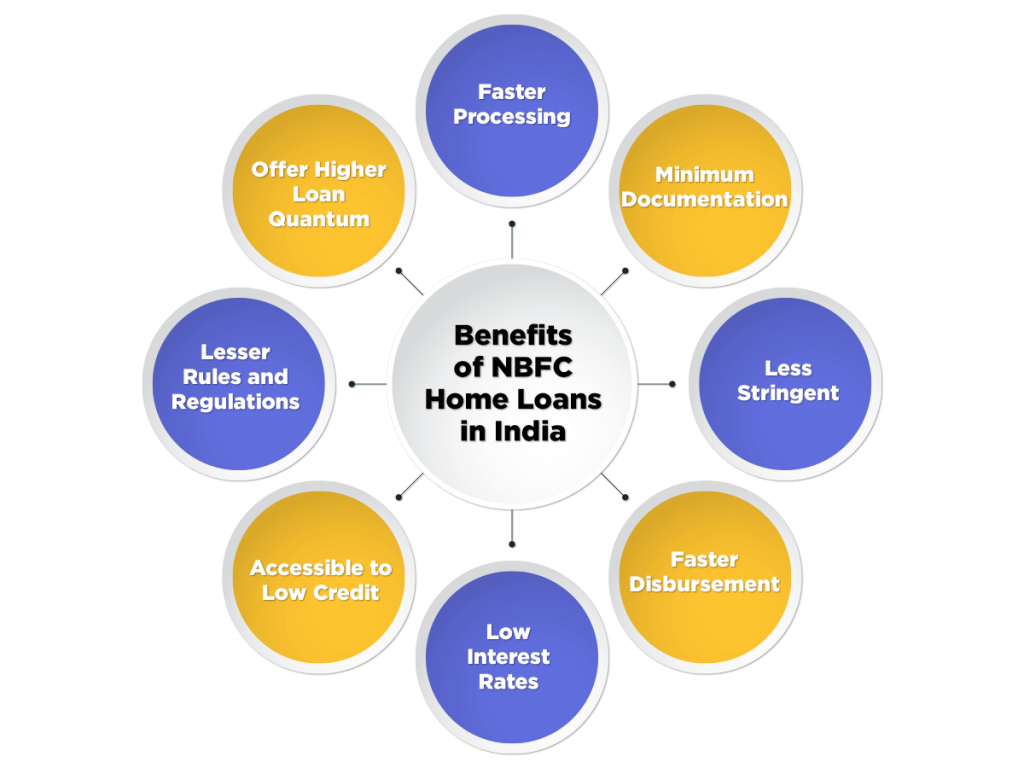NBFC Home Loans: How It Is Better Than Bank Home Loans?

Shivani Jain | Updated: Aug 06, 2020 | Category: NBFC
Nowadays, the trend of choosing NBFC Home Loans over Bank Home Loans is rising swiftly. The main reason behind the rise is the accessibility of loans to borrowers. However, there is still a part of the population present in the economy that faces the dilemma and confusion between NBFC and Bank Home Loans.
This blog will resolve all the issues and discuss factors that make NBFC Home Loans better than Bank Home Loans.
Table of Contents
Concept of NBFC Home Loans
NBFCs or Non Banking Financial Companies are the financial institutions that offer banking services but up to a limited extent. However, these institutions do not have a banking license. That means they are different from commercial banks.
Further, an NBFC is exempt from the ambit of the Banking Regulations Act, 1949, which means it is not required to follow the compliances that of a traditional bank.
An NBFC is not eligible to accept deposits and provide an overdraft facility. However, these institutions can offer underwriting services, credit facilities, and loans. The term “loans” denotes Auto Loan, Gold Loan, Educational Loan, and Home Loan.
Concept of Housing Finance Companies
An HFC or Housing Finance Company is a type of NBFC PAN-India that is engaged in the principal business of offering Finance for the construction, development, and acquisition of Houses.
The Reserve Bank of India has the authority to regulate and administer HFCs in India.
Further, a Housing Finance Company cannot commence its business operations or lend money without obtaining a Certificate of Registration (COR) from the Reserve Bank of India[1] .
Moreover, an HFC can provide NBFC Home Loans for the purchase, renovation, and expansion of a plot or house.
Benefits of NBFC Home Loans in India

The benefits of choosing NBFC Homes Loans over Bank Home Loans are as follows:
Faster Processing
One of the major reasons for the growth of NBFC Homes Loans in India is the faster loan processing facility. Normally, banks take a lot of time to grant a home loan. However, NBFCs process loans faster than banks.
Minimum Documentation
In comparison to traditional banks, NBFCs require less documentation for granting home loans. That means there is a higher chance for an individual to get his/her loan request approved.
Less Stringent
Usually, traditional banks are more stringent in approving a home loan, whereas NBFCs follow a less strict procedure for granting a home loan. This is because the primary objective of an NBFC is to provide easy credit facilities to the backward section of the society.
Faster Disbursement
All the three benefits mentioned above results in the faster disbursement of a loan request. That means there is no need for the applicant to wait for months to get a home loan.
Low Interest Rates
Due to the cut-throat competition in the Home Loan Sector, NBFCs are compelled to offer home loans at low rates. That means the borrower will benefit from both low interest rate and reduced Loan EMI.
The Interest Rates offered by NBFCs on Home loan ranges from 8% to 19%. According to an analysis published by Finance Buddha, the lowest interest rate provided on the Home Loan is by the PNB Housing Finance Ltd. It offers a minimum of 9% interest on a loan amount of Rs 50000.
Accessible to Low Credit Scorers
As specified earlier, banks are more stringent and inflexible in granting home loans than NBFCs. This factor applies to the Credit Score of an individual as well. It means a traditional bank tends to provide loans to that person who has a high credit score.
In contrast, NBFCs are formed for the betterment of the backward section of the society. Therefore, they easily provide loans to people with low credit scores. However, it shall be relevant to note that a person with a low credit score will suffer from high interest rates, and the person with high credit scores will benefit from a low credit score.
Read this Amazing Blog:Difference Between Banks v/s NBFCs
Lesser Rules and Regulations
As an NBFC is different from a conventional bank, it has lesser rules and regulations to follow than a bank.
This feature makes the accessibility of the NBFC Home Loans easy and approval process less intricate and complex.
However, it will be noteworthy to note that the amount of loan disbursed by an NBFC will be lesser than that of a scheduled bank. The reason behind this is that the cases of non-payment also increase with the minimum regulations.
Offer Higher Loan Quantum
The term “Higher Loan Quantum” denotes that NBFC Home Loans include both Registration Cost and Stamp Duty in the Market Valuation of the Property.
For example, the market value of a property is Rs 60 lakhs, and the average stamp duty and registration cost is 5% and 1% of the market value of the property. So, both come to 6% of Rs 60 lakhs, i.e., Rs 360000.
Now, if the Home Loan is taken from an HFC, then the amount of Rs 360000 is already included in the market value of the property. In this way, the borrowers avail of higher loan quantum.
Disadvantages of Bank Home Loans in India
Some of the major disadvantages of Bank Home Loans in India are as follows:
- Traditional Banks follow a complex and intricate process of documentation. Hence, they take more time to process a home loan application.
- Banks do not offer loans to people with a low credit score. That means, if an individual has a credit score of less than 750, he/she will not be able to avail of a home loan in India easily.
- Conventional Banks provide a lower loan quantum in comparison to Housing Finance Companies. This is because the banks usually do not include Stamp Duty charges and Registration Cost in the market value of the property while granting loans.
NBFCs that Provide Home Loans
The NBFCs that provide Home Loans in India are as follows:
- Reliance Capital;
- L&T Finance;
- Mahindra and Mahindra Financial Services Limited;
- Sundaram Home Finance Limited;
- LIC Housing Finance Limited;
- Indiabulls Housing Finance Limited;
- Power Finance Corporation Limited;
- Bajaj Finserv;
- HDFC;
- Muthoot Homefin;
Difference between NBFC Home Loans and Bank Home Loans
| Basis | Housing Finance Companies | Commercial Banks |
| Type of Loans offered | HFCs offer mono-line product, i.e., only Home Loan | Commercial Banks offer loans of all types, such as Home Loan, Educational Loan, Auto Loan, Personal Loan, etc. |
| Lending Rate | PLR (Prime Lending Rate) | MCLR (Marginal Cost of Fund Based Lending Rate) |
| Documentation Process | Less strict documentation process | Stringent procedure for documentation |
| Interest Rates | Lower than Banks | Higher than Housing Finance Companies |
| Overdraft Facility | HFCs do not provide Overdraft Facility | Traditional Banks provide Overdraft Facility |
| Benefits of Interest Rates | Slower in Passing Interest Rate benefits to borrowers as compared to traditional banks | Faster in Passing Interest Rate benefits to borrowers as compared to Housing Finance Companies. |
Factors to Consider Before Choosing NBFC Home Loans
The factors to consider before choosing NBFC Home Loans in India are as follows:
- NBFC Home Loans are based on PLR (Prime Lending Rates), but Bank Home Loans are linked to MCLR (Marginal Cost of Fund Based Lending Rates). MCLR is more beneficial to the owner as it provides similar interest rates on all home loans. However, PLR offers higher interest rates that may fluctuate throughout the period of Home Loan.
- Traditional Banks are obligated to pass on RBI benefits to customers. In contrast, there is no need for an NBFC to pass on any benefit, and it is free to set its own rate of interest.
- Banks are not allowed to lend money below the value prescribed by MCLR, whereas an NBFC is free to provide a loan.
- Banks can provide an overdraft facility on a loan amount. This amount is linked to the borrower’s bank account, and he/she is all free to use it to avail of a surplus amount. However, there is no such option provided by the Housing Finance Companies.
- A Non Banking Financial Company has a smaller customer base than a conventional bank. That means there are high chances for an individual to get his/her loan request approved.
Conclusion
Although the trend of obtaining NBFC Home Loans is rising at a mounting rate, however, it is always advised that an individual must evaluate his/her repayment capacity, understand the concept of Home Loan before applying for it.
In case of any other confusion and perplexity, reach out to Swarit Advisors, our professionals will provide you a clear understanding of NBFC Home Loans. Our experts rank high in NBFC Registration and Advisory Services.
Read, Also:Importance of NBFC















